Finding great B2B sales leads isn’t easy. Every business is different, and what works for one might flop for another. You’ve probably seen endless advice online, some helpful, some totally unrealistic.
The truth? There’s no magic trick. Success comes from testing strategies, refining your approach, and using the right tools. The average sales close rate across industries is approximately 20%. More leads mean more sales, but only if you have the right ones.
In this guide, we’ll share practical strategies on how to generate B2B sales leads, plus the best tools to make your job easier. Let’s jump in!
To generate B2B sales leads effectively, focus on identifying your ideal customer profile, leveraging content marketing, utilizing social media (especially LinkedIn), and implementing targeted email campaigns while also exploring strategies like webinars, networking, and referrals.
Here’s a More Detailed Breakdown of Effective B2B Lead Generation Strategies:
1. Understanding Your Ideal Customer Profile (ICP)
Define your target audience:
Clearly identify the companies, industries, job roles, and pain points you want to serve.
Research their challenges and goals:
Understand what problems they need to solve and what solutions they prioritize.
Create buyer personas:
Develop detailed profiles of decision-makers to guide your marketing and sales strategies.
2. Content Marketing
Create valuable and relevant content:
Publish blog posts, whitepapers, case studies, and webinars that address your audience’s needs.
Optimize content for search engines (SEO):
Use keyword research to improve visibility and attract organic traffic.
Promote your content:
Distribute articles and resources via email, LinkedIn, and industry forums.
3. Social Media (Focus on LinkedIn)
Engage with decision-makers:
Connect with prospects and participate in meaningful discussions.
Join industry-specific groups:
Share insights and establish credibility within niche communities.
Use LinkedIn Sales Navigator:
Leverage advanced filters to find and target high-potential leads.
Post thought leadership content:
Regularly share insights, trends, and success stories to attract engagement.
4. Email Marketing
Build a targeted email list:
Focus on prospects who match your ICP and have shown interest.
Personalize your outreach:
Tailor messages based on the recipient’s role, industry, and needs.
Include strong CTAs:
Encourage actions like booking a demo or downloading a resource.
Automate follow-ups:
Use email sequences to nurture leads over time.
5. Other Lead Generation Strategies
Webinars: Host live or on-demand sessions to educate and capture leads.
Networking: Attend trade shows and virtual events to connect with prospects.
Referrals: Incentivize satisfied customers to recommend your business.
Cold calling/outbound email: Use targeted outreach for direct engagement.
Partnerships: Collaborate with complementary businesses for co-marketing.
Online directories: List your company on platforms like G2 and Capterra.
Chatbots: Deploy AI chatbots to qualify website visitors in real time.
Social proof: Showcase testimonials and case studies to build trust.
SEO optimization: Improve website rankings to attract inbound leads.
What Are B2B Sales Leads?
B2B sales leads are prospective customers who have expressed interest in your brand, products, or services or who match your ideal customer profile (ICP). In B2B interactions, leads are other companies. These often contain different people representing multiple stakeholders and decision-makers to help complete the sales cycle.
Leads come in many forms. There are sales-qualified leads (SQLs), marketing-qualified leads (MQLs), and sales-accepted leads (SALs). Each is determined by different criteria for purchase readiness, location in the pipeline, and other specific criteria.
Companies that see the best results treat lead generation as an ongoing process, not a one-time campaign. Consistent effort beats occasional bursts of activity every time.
Why Is B2B Lead Generation Important?
Finding the right business customers is key to steady sales growth. Targeted lead generation focuses on prospects who actually need your solution. Companies that prioritize lead generation grow 133% faster than those that don’t. Without it, even strong sales teams face inconsistent results.
Quality leads come from research, not guesswork. They match your ideal customer profile and show clear buying signals. This approach turns cold outreach into meaningful conversations.
Consistent lead generation means consistent revenue. Companies that master lead gen grow faster because they don’t constantly scramble to find new prospects. It prevents revenue droughts and supports scaling efforts.
Studies show that businesses spending on lead generation see 5-8x higher ROI than those that don’t.
Still, many companies struggle with lead quality. Reaching decision-makers and standing out from competitors remains tough. Another common issue? Marketing and sales often disagree on what makes a good lead.
These hurdles show why a smarter approach matters. Next, we’ll explore proven tactics on how to generate B2B leads.
How to Generate B2B Sales Leads: Proven Strategies That Actually Work
Getting quality B2B sales leads isn’t about luck – it’s about using the right mix of strategies that actually work. Here are the most effective approaches we’ve seen succeed across industries.
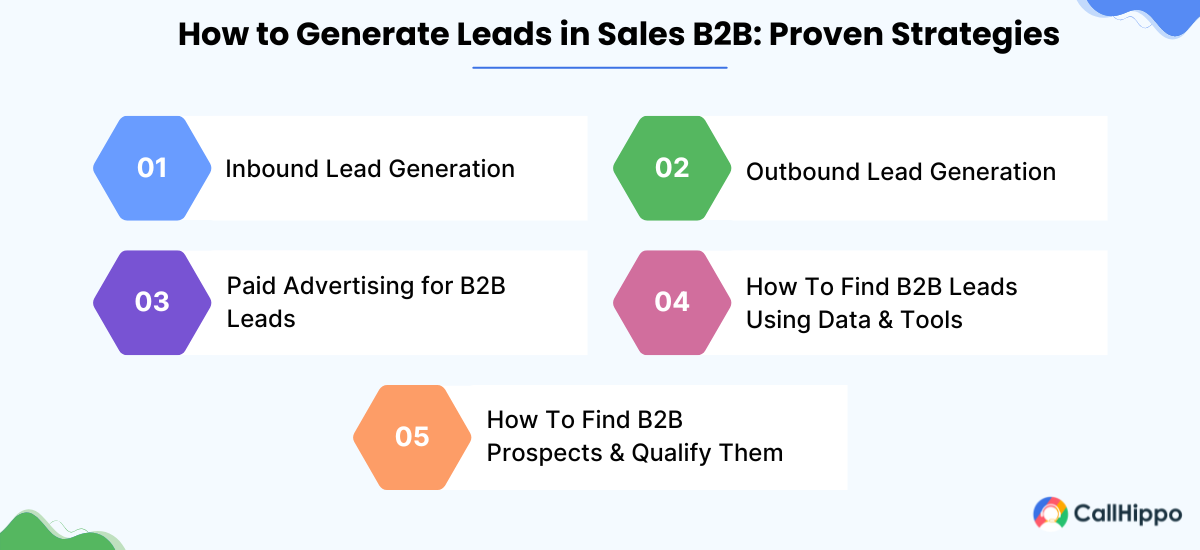
1. Inbound Lead Generation
Inbound lead generation attracts potential customers through valuable content and organic channels. Instead of chasing leads, you pull them in by addressing their needs.
Start with content marketing, such as blogs that answer common industry questions. Whitepapers with original research and case studies showing real results are also helpful. These establish your expertise while attracting leads already looking for solutions.
For SEO, target keywords that your ideal customers search for. Tools like Ahrefs can show what terms competitors rank for.
On social media, LinkedIn dominates for B2B – share insights, join industry groups, and engage with potential buyers’ content. Twitter and niche forums also work well for technical audiences.
2. Outbound Lead Generation
Outbound lead generation involves proactively reaching out to potential customers. This method works best when personalized and research-driven.
Research the company first, reference specific challenges they might face, and keep calls under 90 seconds. For emails, personalize beyond just the name. Mention a recent company milestone or shared connection.
LinkedIn outreach shines when you comment on prospects’ posts before messaging.
Video prospecting also grabs attention. Try 30-second Loom videos explaining why you’re reaching out. Always focus on their needs, not your product.
3. Paid Advertising for B2B Leads
Google Ads captures high-intent searches for solutions like yours. Bid on long-tail keywords like “ERP software for mid-sized logistics companies.” These capture users actively searching for solutions.
LinkedIn Ads let you target by job title, industry, and company size – perfect for reaching decision-makers.
Retargeting keeps your brand top-of-mind. Show different ads to visitors based on pages they viewed, like demo requests for product pages and case studies for blog readers. This nurtures leads through the funnel.
4. How To Find B2B Leads Using Data & Tools
There are many AI sales tools available if you’re wondering how to find B2B leads. Leadfeeder reveals companies visiting your website, even if they don’t fill out forms. Cognism provides accurate contact data, while RollWorks helps target accounts showing buying signals.
CallHippo’s AI Sales Agent handles personalized conversations and follow-ups. It converts leads while your team focuses on closing deals.
These tools save hours of manual research. Intent data shows which companies are actively researching solutions like yours. Look for spikes in related keyword searches or content downloads. Integrate everything with your CRM to track lead sources and prioritize follow-ups.
5. How To Find B2B Prospects & Qualify Them
Define your Ideal Customer Profile (ICP), including their company size, industry, budget, and key challenges. Use lead scoring frameworks like BANT (Budget, Authority, Need, Timeline) to assess readiness. CHAMP (Challenges, Authority, Money, Prioritization) works better for complex sales.
AI tools can also analyze website behavior and email responses to predict which leads will convert. Automated lead research tools pull recent news and trigger events (like funding rounds) that signal buying potential.
Best B2B Lead Generation & Conversion Tools
The right sales tools can make or break your lead generation efforts. Forget about manual prospecting and guesswork – today’s top-performing teams rely on specialized software to find, engage, and convert more leads. These five tools have proven their worth across hundreds of B2B companies, helping sales teams work smarter, not harder.
1. AI Sales Agent (by CallHippo) – AI-Powered Sales Outreach
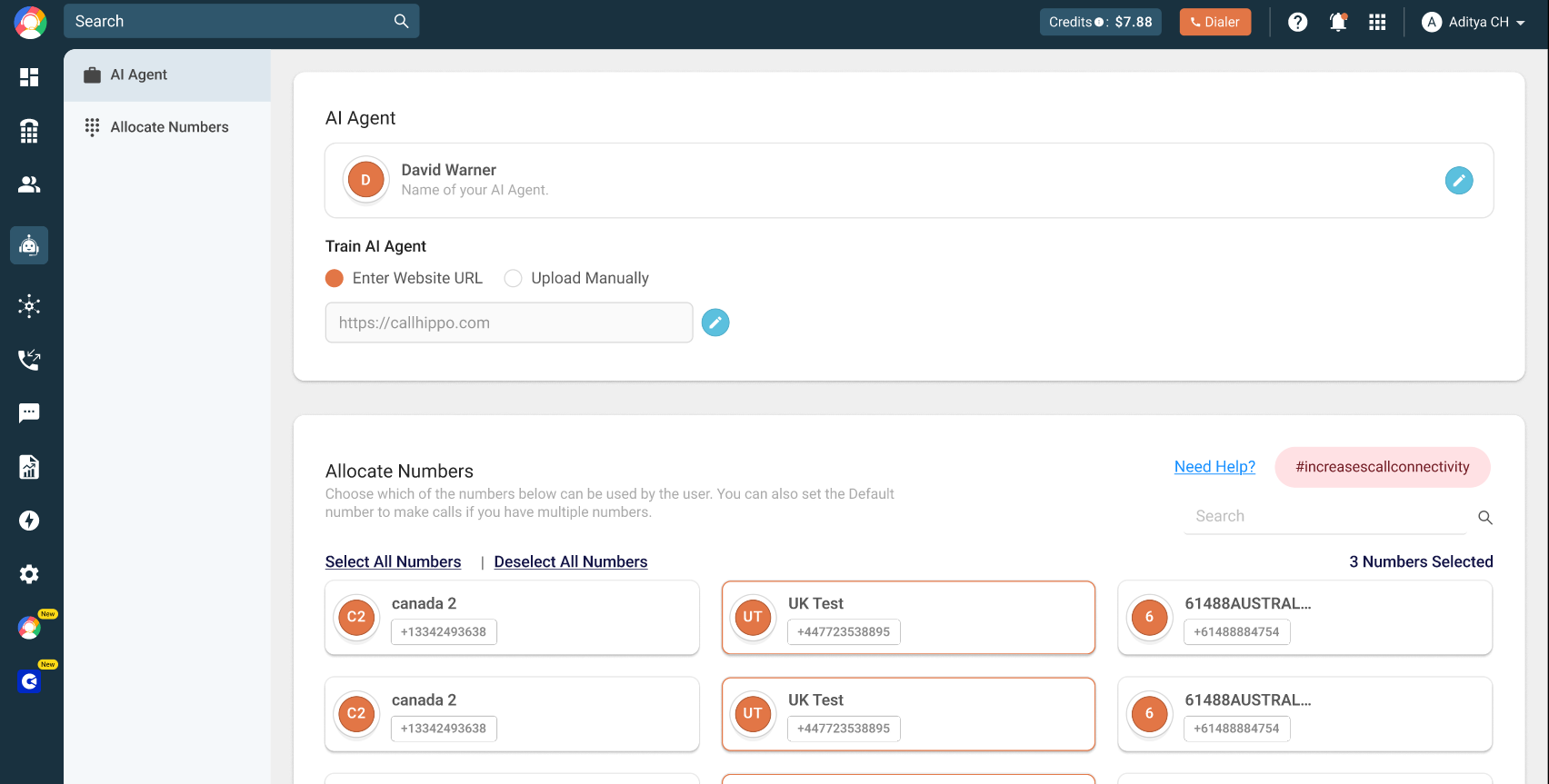
CallHippo AI Sales Agent is an AI-driven sales tool that enhances efficiency by enabling you to build custom sales agents for automated outreach. It goes beyond basic chatbots to handle complete sales conversations with human-like quality. The AI learns from each interaction, improving its responses over time.
What makes it different? It doesn’t just send generic messages. The AI analyzes company websites and LinkedIn profiles to personalize each outreach, referencing specific pain points. For teams drowning in leads, it’s like having an extra sales rep working 24/7.
With CallHippo AI Sales Agent
- Lead Generation
- Sales Automation
- Personalized Prospect Engagement
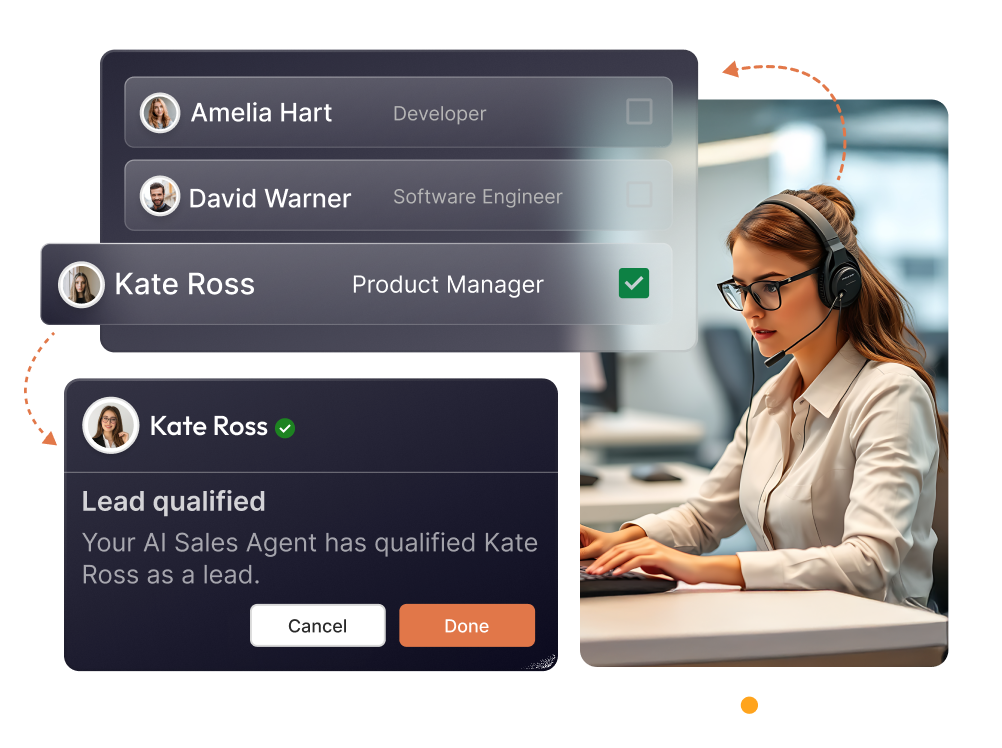
2. LinkedIn Sales Navigator – Advanced B2B Prospecting
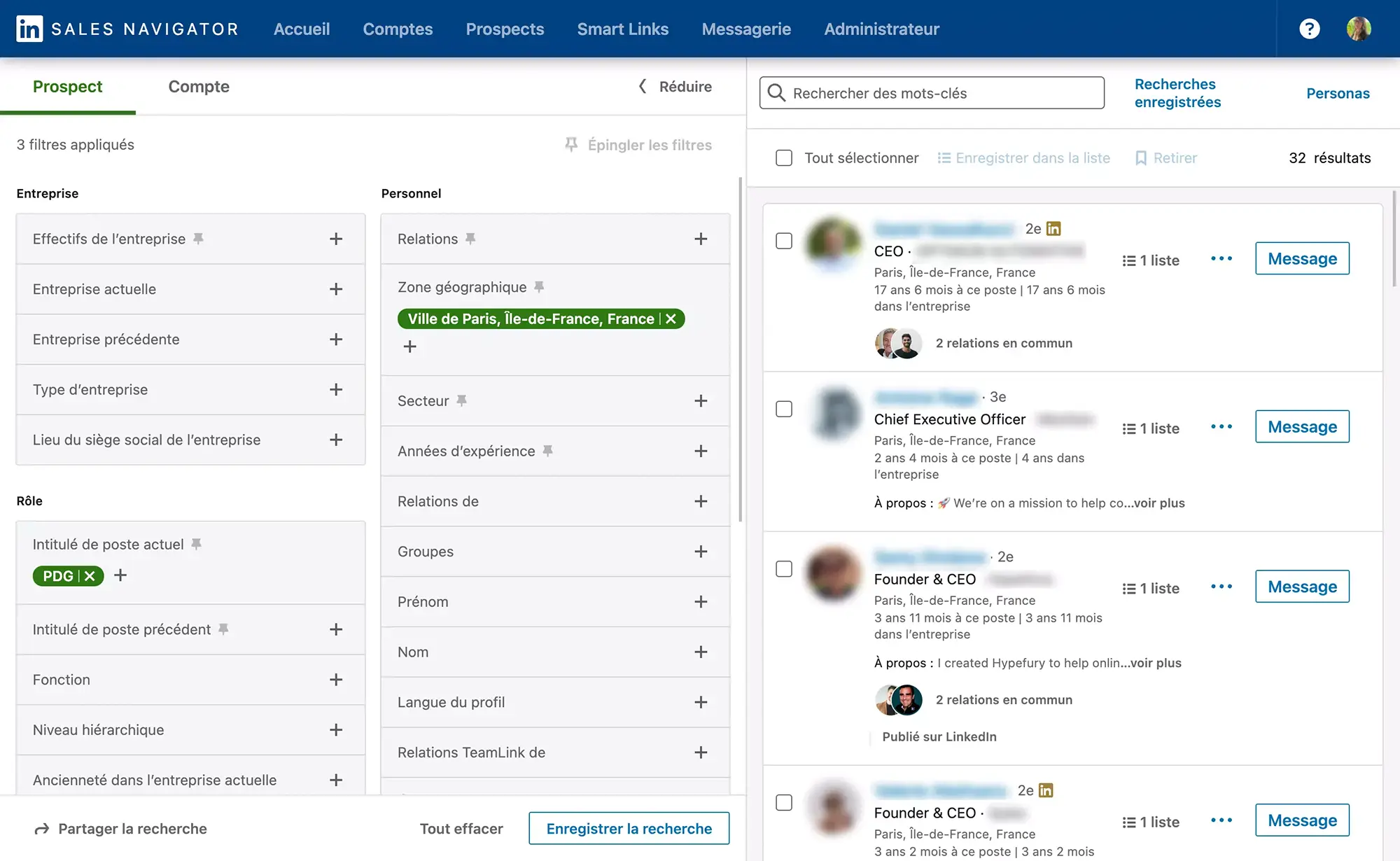
LinkedIn Sales Navigator is a premium sales intelligence platform that gives you direct access to key decision-makers in your target accounts. Unlike basic LinkedIn profiles, it provides the specialized tools for sales teams to cut through organizational noise and connect with real buyers.
The advanced search filters let you pinpoint prospects by job function, company growth signals, and even group memberships. You can also combine it with a simple Chrome extension like Contact Out to pull email addresses directly from profiles.
3. Apollo.io – Contact Database & Outreach Automation
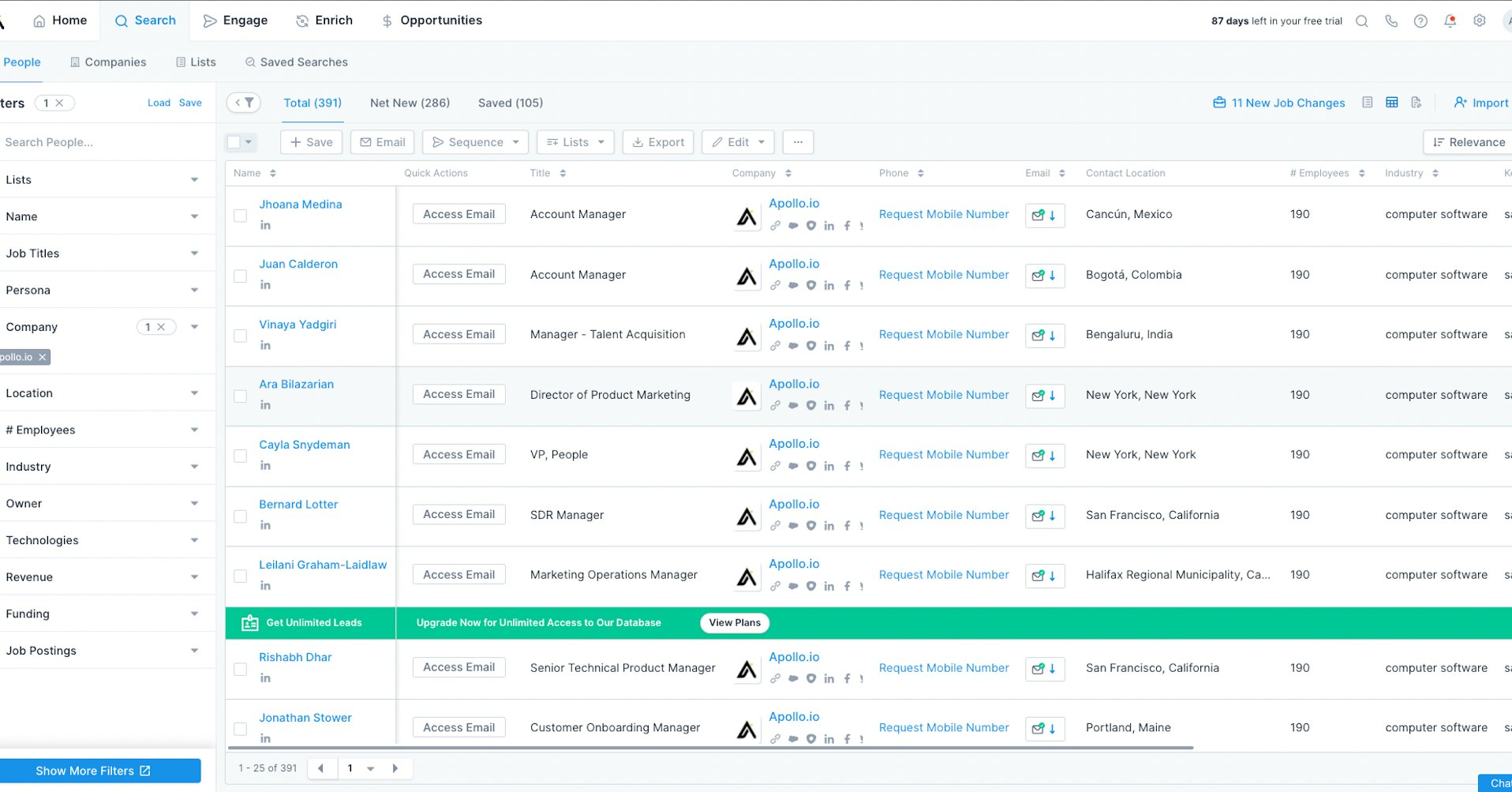
Apollo.io solves three major headaches for sales teams. Its database contains millions of verified B2B contacts, and the sequencing tool automates follow-ups without sounding robotic. You can add personalized variables that make each email feel handwritten.
It also seamlessly syncs everything with CRM, such as Salesforce. But the real game-changer is their intent data. Apollo tracks content downloads and search behavior to show which companies are actively researching solutions like yours. When a target account shows high intent, you’ll know to prioritize it immediately.
4. HubSpot CRM – Lead Tracking & Nurturing
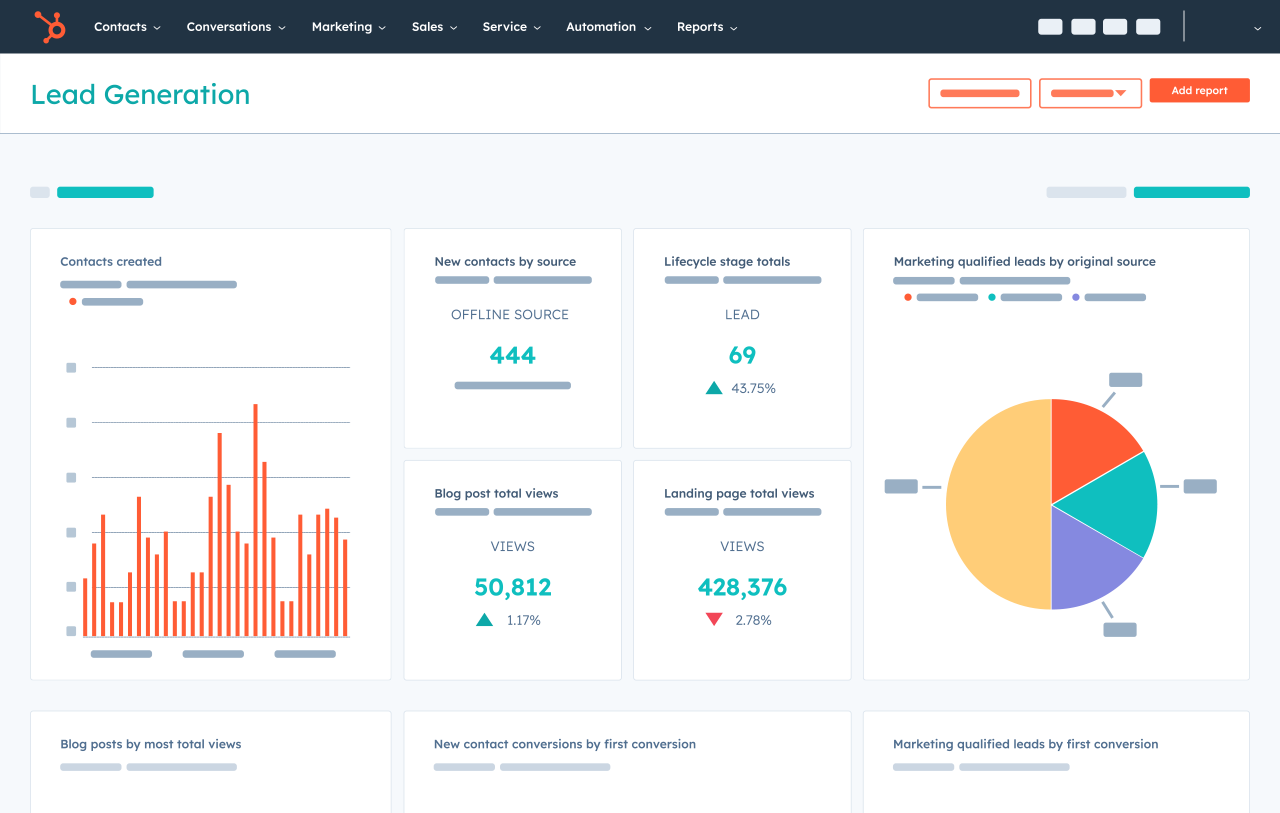
HubSpot CRM keeps everything organized when leads start pouring in. The visual pipeline view gives instant clarity on which deals need attention. Built-in email templates also save your team’s time.
The lead scoring system helps focus efforts on hot prospects most likely to convert. While the free version handles basic needs, the paid features, like predictive scoring and call tracking, take it to another level. Their mobile app also works well for on-the-go updates, unlike many clunky CRM apps.
5. Drift – Conversational Marketing & Live Chat
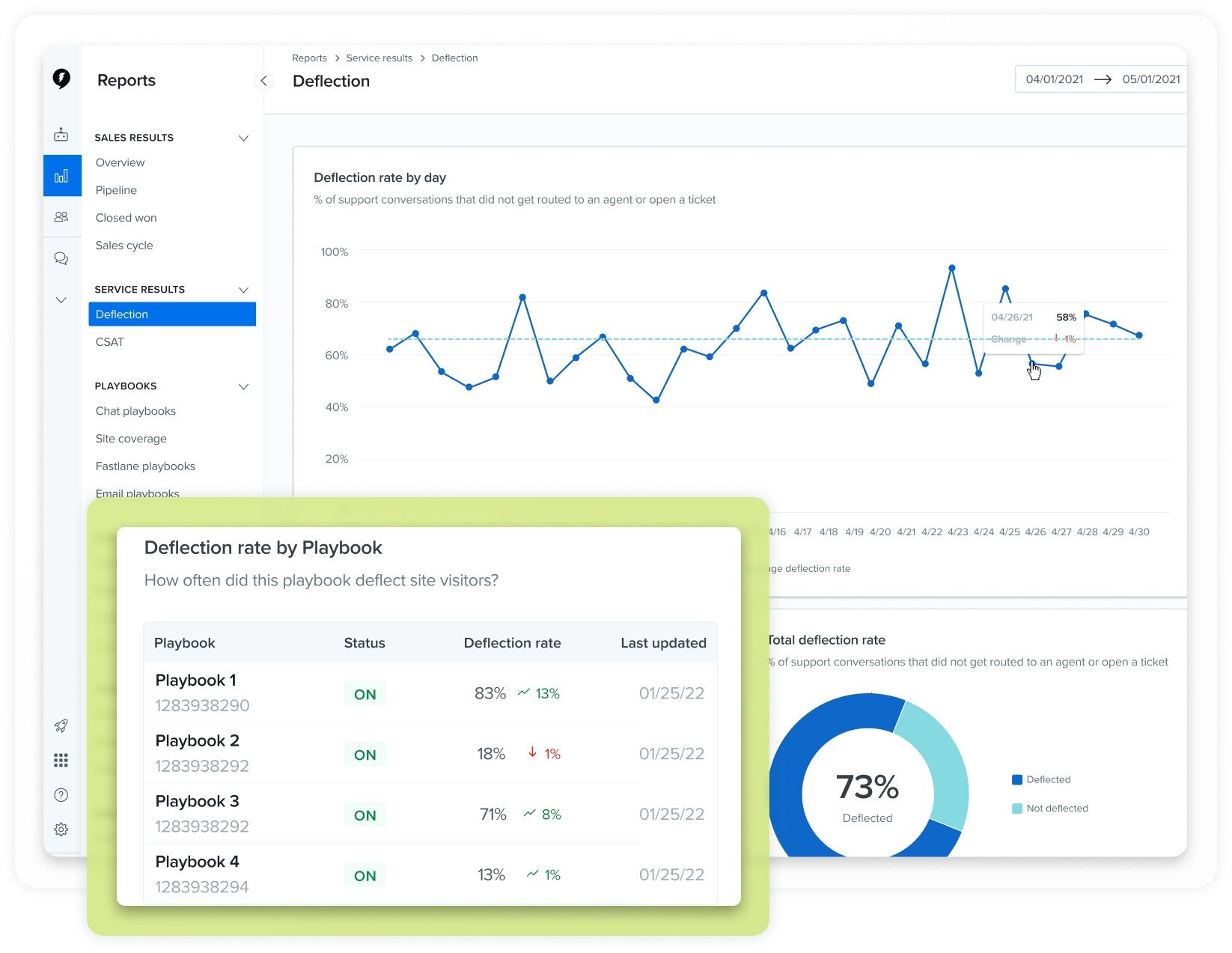
Drift instantly transforms website visitors into qualified leads. Traditional chatbots often frustrate visitors with rigid menus, but Drift’s conversational AI feels remarkably human. It asks natural qualifying questions and knows when to transfer to a live rep.
The meeting booking feature eliminates endless email threads. Prospects can schedule demos directly from the chat window. Their “playbooks” let you create different conversation flows for various visitor types. Pricing page viewers get different treatment than blog readers.
The biggest mistake teams make is using too many tools at once. For example, if your website gets traffic but few conversions, prioritize Drift. If outbound emails go unanswered, try CallHippo’s AI agent. Tools work best when they solve specific problems rather than creating more complexity.
Top B2B Lead Generation Channels to Dominate in 2025
The B2B lead generation methods keep evolving, but some channels consistently deliver results. These three approaches remain top performers for finding and converting quality leads in 2025:
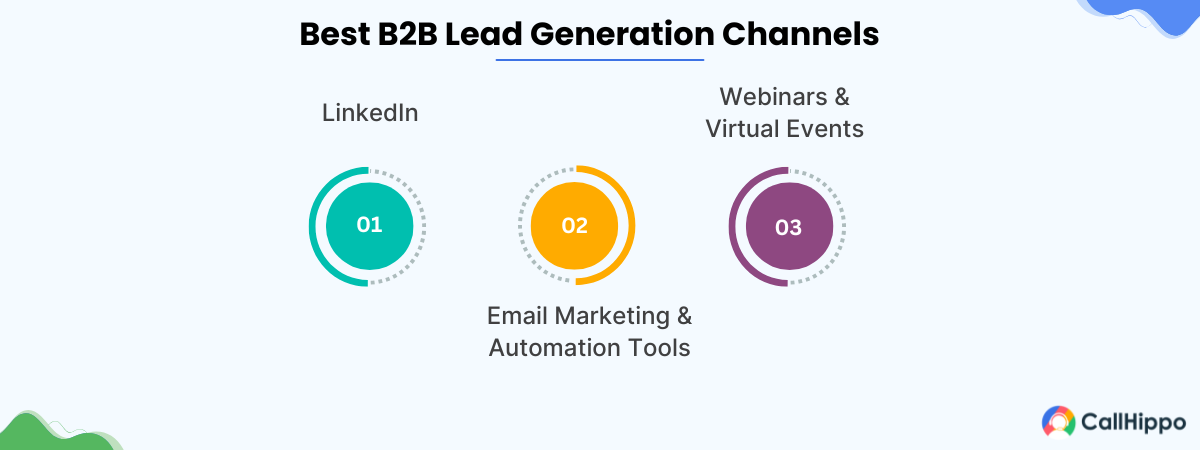
1. LinkedIn: The #1 B2B Lead Source
LinkedIn continues to dominate for B2B lead generation because it puts you directly in front of decision-makers. The platform’s professional focus means users already have a business mindset when engaging with content. Sales Navigator takes this further with advanced filters to pinpoint exactly who influences purchases at target accounts.
Focus on building genuine connections rather than blasting generic messages. Comment on prospects’ posts before sending connection requests, and always personalize emails. Groups are also highly useful as niche industry communities often contain highly engaged professionals actively seeking solutions.
2. Email Marketing & Automation Tools
Email marketing is a central aspect of lead generation. It can be an incredibly valuable touchpoint for potential buyers in the sales process.
Leveraging personalization throughout your email marketing campaigns assists in generating better leads that convert into pipeline activity. Research target accounts, their social media, existing solutions, pain points, etc. This can put you in the right position to develop a successful email marketing campaign.
The most effective campaigns combine hyper-personalization with strategic automation. Tools like CallHippo’s AI Sales Agent enhance this by handling initial outreach with human-like conversations that adapt based on responses.
3. Webinars & Virtual Events for Lead Capture
Webinars attract highly qualified leads because registration requires genuine interest. They work particularly well for complex solutions needing demonstration. The format allows deep dives into industry challenges while positioning your team as experts.
Promote events through LinkedIn and targeted emails for maximum attendance. Record sessions to repurpose as gated content afterward, as this extends their lead generation value.
The follow-up is critical as webinar attendees are warm leads primed for conversion. Send personalized thank you emails referencing their specific questions or poll responses during the event. Combine with breakout room networking sessions to build relationships that accelerate sales cycles.
The Top B2B Lead Generation Mistakes You’re Probably Making (And How to Fix Them)
Many companies struggle with lead generation because they keep making the same basic errors. This wastes time and leaves sales teams frustrated with poor-quality leads. Here are the three most common pitfalls we see and how to avoid them.
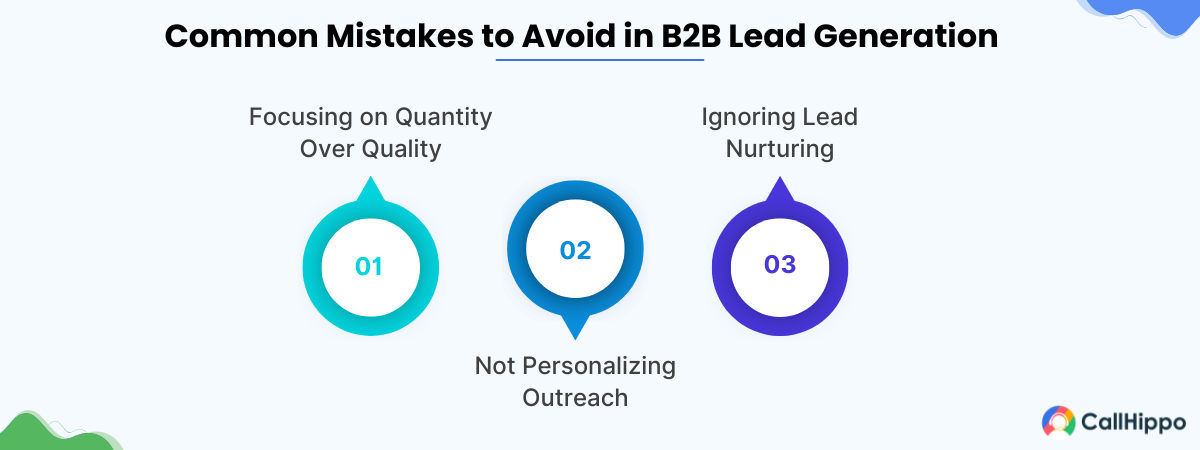
1. Focusing on Quantity Over Quality
A packed pipeline means nothing if most leads never convert. Too many teams chase high lead numbers to hit targets, only to realize later that most contacts aren’t decision-makers or even a good fit.
Spray-and-pray tactics like mass LinkedIn connection requests or generic cold emails might generate responses, but they rarely lead to closed deals. Instead, prioritize leads that match your ideal customer profile (ICP).
Properly qualified leads are 5+ times more likely to close than unqualified ones. Marketing and sales must agree on what makes a lead sales-ready before launching campaigns. A smaller list of well-researched prospects will always outperform thousands of random contacts.
2. Not Personalizing Outreach
Decision-makers receive hundreds of generic pitches weekly. “Dear Sir/Madam” emails with templated content get deleted immediately. Buyers ignore these templated messages because they can spot automation from a mile away.
Effective personalization requires research into each prospect’s specific situation. In your opening lines, reference the company’s recent achievements or challenges. Mention any mutual connections you share. Personalized emails see response rates 2-3 times higher than generic blasts. This extra effort makes all the difference in crowded inboxes.
3. Ignoring Lead Nurturing
Most B2B buyers don’t convert after the first touchpoint. Companies lose countless opportunities by giving up too soon or failing to nurture leads properly. A single unanswered email doesn’t mean a prospect isn’t interested. Iit just means they’re not ready yet.
Most prospects need multiple touchpoints before committing. Without proper follow-up, 80% of leads go cold. Build a structured follow-up sequence with multiple touchpoints (emails, LinkedIn messages, and helpful content).
The best sales teams track engagement and adjust their approach based on how leads interact. A lead who downloaded a whitepaper last month might be ready for a demo now. Case studies work well for mid-funnel leads, while product comparisons help near-final decisions. According to industry benchmarks, companies using lead nurturing generate 50% more sales at lower costs.
Conclusion
Generating quality B2B leads needs smart work, not hard work. The best strategies blend inbound and outbound tactics. Use LinkedIn for direct connections, targeted emails that actually get read, and webinars that attract ready-to-buy prospects. Tools like CallHippo’s AI Sales Agent and Sales Navigator help automate the grind, but they’re only as good as your strategy.
The takeaway? Start with a clear ideal customer profile, personalize every interaction, and track what works. Instead of vanity metrics, focus on leads that convert and not just fill your pipeline. Test different channels, but master a few before adding more. Most importantly, treat lead gen as a process, not a one-off effort..
At the end of the day, great lead generation comes down to two things. One is understanding your buyer’s needs. The second is showing up with the right solution at the right time.
FAQs
1. How To Qualify Leads in B2B Sales?
Properly qualifying B2B leads prevents wasted time on dead-end opportunities. Start by understanding the prospect’s actual needs. Many visitors just want information, not your solution.
Ask specific questions about their challenges rather than making assumptions. Next, verify if your offering truly fits their situation. Confirming their timeline is also important. These checks efficiently filter out unqualified leads.
2. How Much Is a B2B Lead Worth?
The value of a B2B lead varies dramatically depending on several factors. Basic contact lists with minimal details might cost $20-40 per lead. However, these often contain outdated or unqualified contacts that rarely convert.
High-quality leads with verified contacts can cost $50-100 each. These usually include job titles, company size, and sometimes indications of interest. The real metric isn’t lead cost but the cost per acquisition – how much you spend to get one paying customer.
3. What Is a Typical B2B Sales Commission?
B2B sales commissions vary widely depending on what you’re selling and how the deal gets done. For physical products, reps typically earn 7-15% of the sale value or 20-40% of the gross margin.
Services often pay higher – sometimes 20-50% – since there’s less overhead. SaaS companies usually offer 5-20% of the annual contract value. The actual percentage depends on several factors.
4. What Is a Good Win Rate for B2B Sales?
A solid B2B sales win rate typically falls between 20% and 30%, but this varies widely depending on what you’re selling and who your target audience is. Enterprise deals with long sales cycles might see 15-25% win rates. Simpler, mid-market transactions, on the other hand, often hit 25-35%.
Complex solutions naturally have lower conversion rates than straightforward products. Seasoned sales teams know it’s more valuable to track why deals are won or lost than to obsess over percentages alone.

Subscribe to our newsletter & never miss our latest news and promotions.









